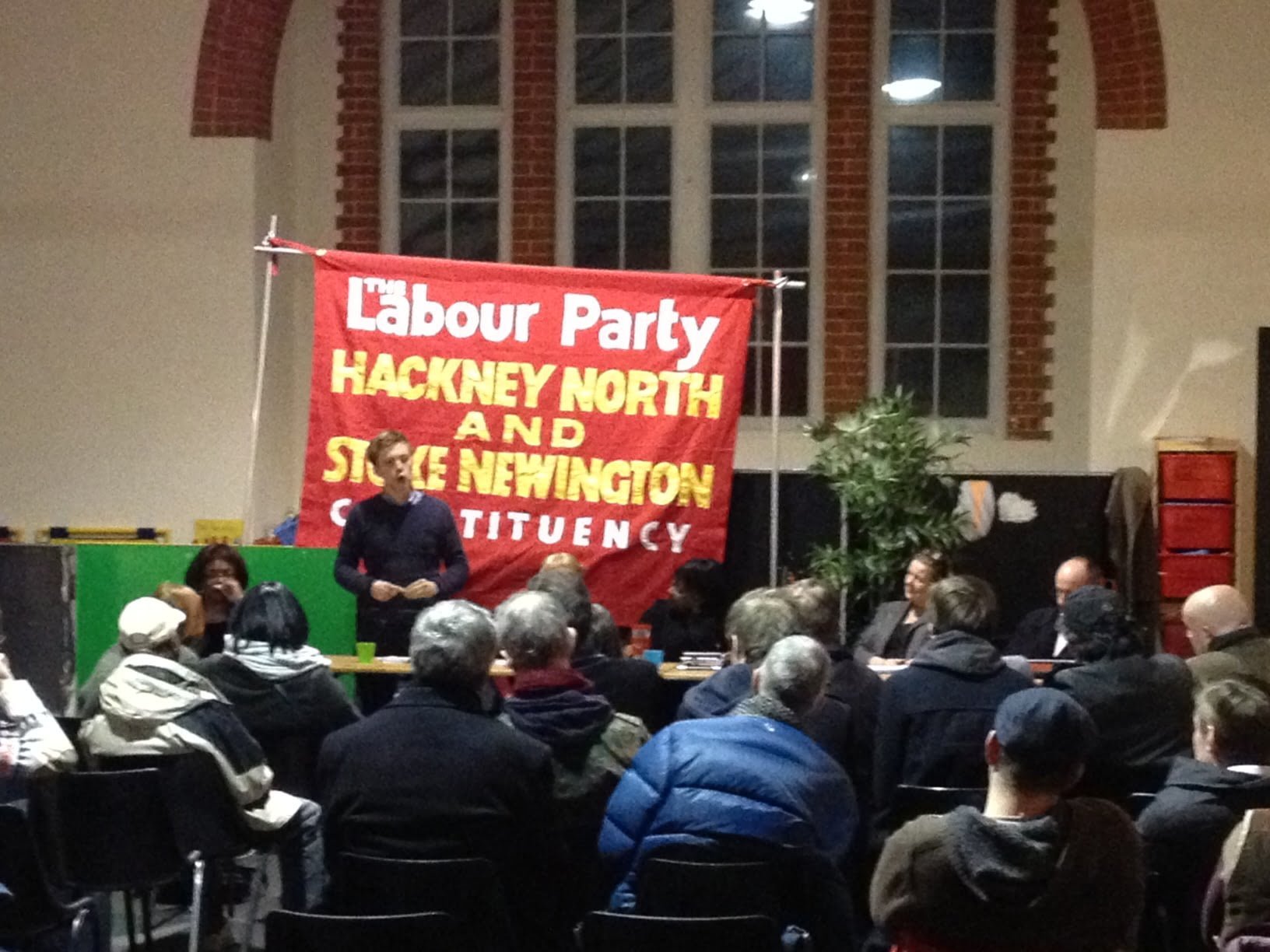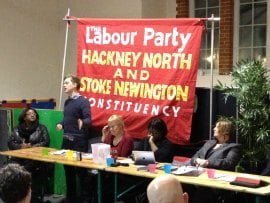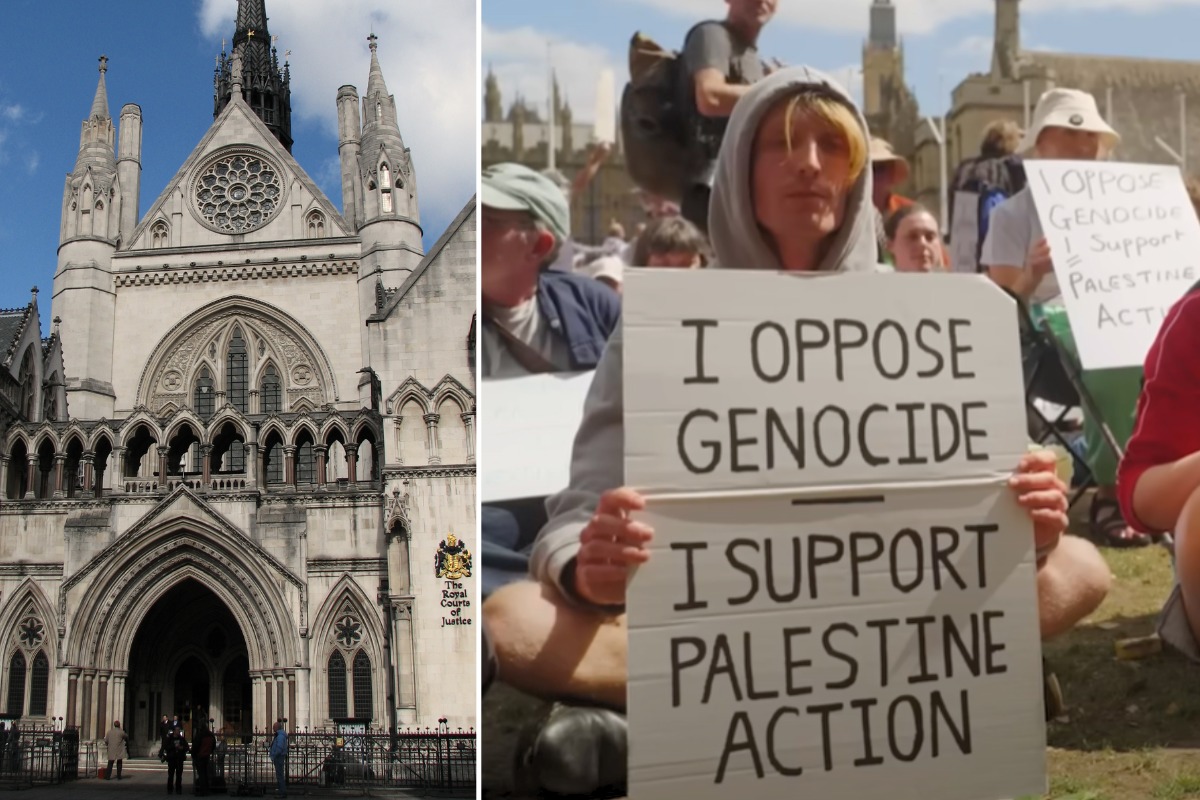On Tuesday 12th March, over 100 local residents, trade unionists, and Labour Party members met in the Abney Hall in Hackney, London, to hear about the changes taking place to welfare and benefits and to discuss the way forward in the fight against these attacks. Adam Booth, Labour Party member from Hackney North and Stoke Newington CLP, discusses the attacks on welfare and benefits, and the need to fight back.
On Tuesday 12th March, over 100 local residents, trade unionists, and Labour Party members met in the Abney Hall in Hackney, London, to hear about the changes taking place to welfare and benefits and to discuss the way forward in the fight against these attacks.
The meeting – entitled “The Great Benefits Swindle” – was called by North Hackney and Stoke Newington Labour Party and began with a description of the devastating impact that the welfare cuts will have nationally and to Hackney residents in particular.
Wendy Pettifer of the Hackney Community Law Centre, Jennette Arnold from the Greater London Assembly, and Jules Pipe, the Mayor of Hackney, all spoke from the platform about the changes taking place, which include: an overall cap on the amount of benefits that a single household can claim, regardless of circumstances; the reduction of annual housing benefit increases to the level of the Consumer Price Index (CPI), which is a far lower measure of inflation than the actual increase in rents; the abolition of Council Tax Benefit and the localisation of council tax support; and the now infamous ‘Bedroom Tax’, which reduces the amount of housing benefit that families can claim if they are deemed to be living in “under-occupancy”, i.e. have an extra bedroom.
These attacks on benefits – made by a government of the rich, by the rich, and for the rich – are aimed directly at the most vulnerable and poor in society. The speakers described how these attacks will hit the people of Hackney particularly hard, where almost one-in-two households are reliant on some form of welfare support. For example, almost 28,000 households in Hackney will be affected by the changes to Council Tax Benefit; for these families, there will be a decision to make between paying the council tax or heating their homes and putting food on the table. This is no choice.
Owen Jones, author of “Chavs, the demonization of the working class” and journalist for the Independent, also spoke, linking these latest attacks from by the coalition government to the wider crisis in the economy, and in particular to three major issues in society: the jobs crisis, in which there are simply not enough jobs to go around at the current time, causing high unemployment that in turn causes more and more people to become reliant on Jobseekers’ Allowance; the low-wages crisis, in which those who are in work are reliant on housing benefit and tax credits because employers pay below a living wage; and the housing crisis, in which millions of households are reliant on housing benefit due to parasitic landlords and high rents, and in which the building of new social housing has ground to a halt.
Socialist Appeal agrees with Owen Jones on identifying these symptoms; however, we believe that it is necessary to go further and also identify the disease. The common cause of all these problems – the lack of jobs, the exploitation and prevalence of low-waged jobs, and the lack of housing – is the capitalist system – a system in deep crisis – which only produces for profit.
The lack of jobs is because there is already severe overproduction – referred to by the capitalists as “excess capacity” – in the economy. In other words, the capitalists are already producing more than they can sell – more than they can ever sell – because of the nature of capitalism, in which workers are paid less than the value of what they produce. This inability to sell their goods means that the capitalists are not investing and creating jobs; instead, they are closing down production, leading to a loss of jobs and an increase in unemployment.
The prevalence of low-paid jobs is again the result of an economic system where production is privately owned, with competition between different capitalists, run in the interest of profit. This competition necessarily means that each capitalist will do whatever is necessary to drive down costs, including paying as little as possible.
And the lack of housing is due to the same overproduction as the lack of jobs – there are many empty houses that have been privately built during the years of the housing bubble, but cannot now be sold due to the credit crunch and the unaffordability of such properties for the majority of people.
 The solution put forward by Owen Jones, and by many others within the labour movement, is to have a mass programme of building council homes, which would mop up unemployment and eliminate the housing crisis. We agree that it is a contradiction that there is unemployment alongside many things in society that need to be built. But how is the government going to pay for such a programme when the financial markets are already downgrading their credit rating and telling them to cut more?
The solution put forward by Owen Jones, and by many others within the labour movement, is to have a mass programme of building council homes, which would mop up unemployment and eliminate the housing crisis. We agree that it is a contradiction that there is unemployment alongside many things in society that need to be built. But how is the government going to pay for such a programme when the financial markets are already downgrading their credit rating and telling them to cut more?
The solution, therefore, is not a Keynesian one of government stimulus, but a socialist one: to place the banks and the major levers of the economy – including the construction companies – under democratic public control so that housing, infrastructure, schools, and hospitals can all be built.
The final speaker was Diane Abbott, MP for North Hackney, who spoke of her anger at how the media – and some in the Labour Party also – often blamed immigration for the lack of housing, jobs, and public services. We agree with Diane on this point that immigration should not be made a scapegoat for any scarcity in society. But we must also then explain the real cause of this scarcity – again the senile system of capitalism that is in a deep crisis, and which is no longer able to provide the basic necessities of life for workers and youth.
Following the speakers, a member of the audience spoke from the floor about the work that Unite the Union were doing in organising communities through their ‘community membership’. The rest of the audience heard about how the fight against welfare attacks was a priority for Unite – Britain’s biggest union – and Len McCluskey, the General Secretary of Unite. Pamphlets were available during the meeting from Unite, giving details of the changes to benefits and also providing ideas of how to fight back. Suggestions included: setting up local campaign groups; building a broad movement of resistance; lobbying local MPs and councillors to pledge for a reversal of this deeply regressive policy; and, if necessary, taking direct action to block evictions.
Socialist Appeal applauds the step taken by Unite to offer a lead, and in particular in providing suggestions on how to resist and fight. The Unite pamphlet even mentioned the example of the Anti-Poll Tax campaign in 1988-91, a campaign led by the Militant Tendency – the Marxists of the Labour Party and trade unions – in which millions defied the Thatcher government and refused to pay the Poll Tax. Mass demonstrations were organised and bailiffs were physically prevented from entering households by human barriers. This mass movement should indeed be an inspiration for people today in fighting the attacks on benefits, as was stated in the meeting by Socialist Appeal supporters.
Socialist Appeal supporters went further and pointed out that the Anti-Poll Tax campaigns defied the law, and noted that similar illegal tactics would be required today to defend residents from bailiffs and evictions. A mass movement against the welfare attacks, organised through the labour movement with the involvement of local community groups and tenants associations, could be used to topple what is, in reality, a very weak government, just as the Anti-Poll Tax campaigns did, forcing Thatcher out of office.
Socialist Appeal also contributed to the discussion by noting the inspiring examples of the Labour Councillors in Hull, who were refusing to carry out the Coalition’s cuts. Again, such an example can act as an inspiration to the labour movement across the country in fighting cuts to welfare, jobs, pensions, and public services.
The big question to ask – and which was asked by Socialist Appeal supporters in the meeting – is: where do we go from here in fighting the welfare cuts? As we pointed out in the meeting, there are many militant examples already of how to begin the fightback, from the Anti-Poll Tax campaigns over two decades ago, to the recent example of the Hull councillors, and also the suggestions and lead taken by Unite the Union. The real question, which was posed to the panel in the meeting, is: will the Labour Party be willing to support these actions, including supporting Labour councillors who refuse to carry out cuts and local campaign groups who use direct action to stop evictions?
In responding to audience, the panel largely avoided this important question. Diana Abbott spoke of the need for “unity”, citing the example of rate-capping and the GLC (Greater London Council), where differences emerged within the Labour Party elected representatives over whether to support illegal actions in fighting the cuts. At that time, the Labour Party leadership supported the policy of the “dented shield”, suggesting that Labour councils should not pursue illegal action, but should attempt to carry out the cuts with the least damage to frontline services.
Today, it is vital that the Labour Party leadership come off the fence and take a clear stance against cuts, promising to reverse all the Coalition’s cuts after the 2015 General Election and supporting Labour councillors that refuse to carry out the cuts before 2015.
From the current examples in Hull and elsewhere – where councillors who refuse to implement cuts have been punished by the Labour leadership and told that they should vote through cuts – it is clear that the position of the Labour leadership is again along the lines of the “dented shield” approach. It is a scandal that Miliband has spoken openly at times about how he cannot promise to reverse all the cuts after 2015.
We are of course for unity, but this must be a unity in refusing to carry out a single cut, organising through the labour movement and local communities, taking strike action – and illegal action where necessary – in order to defy the coalition government and protect ordinary people. This is the unity we need: the unity of workers, youth, pensioners, the poor and the unemployed, in a militant struggle against all cuts and for socialist policies.
Diane Abbott ended the meeting by telling the audience that these were all “ideological” cuts on behalf of the Coalition – a millionaire’s government. It is true that the Tories might take particular delight in attacking the working class and the poor; but we must also be clear that these are not “ideological” cuts – they are the necessary result of the capitalist crisis, which has forced governments of all colours across Europe to implement austerity, including social democratic parties in Greece, Spain, and even France.
The Labour leaders in Britain must be under no illusions that they can somehow avoid making similar cuts in the future within the confines of capitalism. Under capitalism, there is no future for young people; no alternative but austerity. However, the labour movement, armed with a socialist programme to take control of the commanding heights of the economy and put these to use in the interests of ordinary people, could guarantee full employment, a living wage, free education and healthcare, and a home for all. This is a future worth fighting for.






